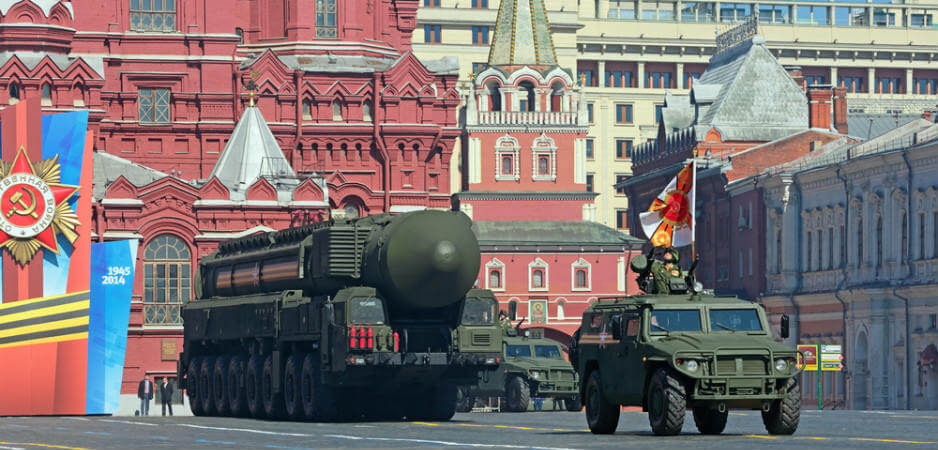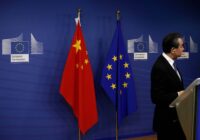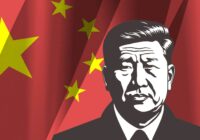Despite breaking the agreement with Moscow, Washington’s withdrawal from the Intermediate-Range Nuclear Forces Treaty is most likely a measure specifically aimed at Beijing.
US President Donald Trump’s recent intention to withdraw from the 1987 Intermediate-Range Nuclear Forces Treaty (INF Treaty) with Russia brought the issue of nuclear security to the top of the agenda once again. In October, Washington cited a violation of the conditions of the treaty by Moscow as a formal reason for breaking the agreement. According to Trump, Russia has been creating new offensive weapons — and not for the first time — which is prohibited by agreement. In particular, Washington is worried about Russia’s SSC-8 missile system, which, according to US Undersecretary of State Andrea Thompson, has a range of 500-5,500 kilometers.
In turn, Moscow states that it informed the Americans of the technical characteristics of the missile and provided the results of its tests. The Russian military claims that the launch of the SSC-8 was conducted at a distance significantly lower than 500 kilometers. However, the Pentagon believes that the characteristics, as well as the range of the missile, can change and hit the target at 5,500 kilometers from the launch site.
The first accusations of a breach of agreement were made in 2014, when Washington presented a report that claimed Moscow tested the latest ballistic missile back in 2008. At the time, there was no question of exiting the treaty. Then-President Barack Obama only expressed concern and threatened to file a complaint of violations with NATO. However, this was the end of it. President Trump has gone on to criticize the previous administration for maintaining this treaty despite all the evidence of violations.
Moscow has also made accusations of American non-compliance with the conditions of the INF Treaty. The Russian side believes that the US Aegis Ashore missile defense systems in Romania and Poland are “dual use” weapons. According to Russian specialists, these complexes have not only defensive, but also offensive functions. For Moscow, the appearance of American ballistic missiles in Europe means that NATO would have the capacity to sweep Russian territory almost as far as the Ural Mountains. In connection with the protracted crisis in relations between Russia and the West, Moscow seriously contemplates potential outcomes of the situation.
“If the United States does withdraw from the INF treaty, the main question is what they will do with these newly available missiles. If they will deliver them to Europe, naturally our response will have to mirror this,” Russian President Vladimir Putin told reporters.
You’re the Reason I’m Leaving
The prospect of the United States leaving the agreement is unpopular with European leaders. In the event of a conflict between Moscow and Washington, the main military theater will be in Europe. “The announcement by the United States that it intends to withdraw from the INF Treaty is regrettable,” noted Germany’s foreign minister, Heiko Maas. “It poses difficult questions for us and for Europe. We also ask the United States to consider the possible impact of its decision.”
However, the United States has accumulated quite a few reasons for leaving the treaty, regardless of whether Russia is really violating its terms. More than 30 years have passed since the signing of the INF Treaty. During this time, the world has changed in meaningful ways. New technologies and economic development in what used to be considered to be Third World countries has forced the US to think about military threats beyond Russia. Today, Iran has the ability to launch long-distance nuclear charges, with Pakistan is nearing this capacity as well. In 2017, North Korea’s ballistic missile tests created a serious crisis on the Korean Peninsula. President Trump directly threatened Kim Jong-un that North Korea would “be met with fire and the fury like the world has never seen.”
Despite the cessation of missile tests after a summit in Singapore between Trump and Kim, North Korea’s leader still has the opportunity to return to these interrupted drills at any moment. However, it’s possible that these launches from the DPRK could have never happened if it weren’t for China’s influence. Beijing is Pyongyang’s most important ally in the region, both ideologically and economically. China helps North Korea to survive under international sanctions by supplying the republic with food and energy. Beijing uses Pyongyang to contain American presence in South Korea. The launch of North Korean’s ballistic missiles could have been China’s way to start bargaining with the US about reducing the number of US military and weapons (the same Aegis Ashore) in the region. That’s exactly what Beijing and Moscow criticized the Americans for during the crisis on the Korean Peninsula.
Experts have long predicted that China will be playing the role of the new world hegemon. The rapidly developing economy and the country’s military capabilities are forcing the West to seriously think about containing this growing influence. Three or four highly mobile medium-range missile systems allow China to deliver a sudden strike from anywhere in their country. This alignment of forces affects not only US allies in the region, but also directly threatens the US military based in South Korea and Japan.
Thus, despite breaking the agreement with Moscow, Washington’s withdrawal from the INF Treaty is most likely a measure specifically aimed at Beijing. This is partly confirmed by President Trump’s national security adviser, John Bolton, who tried to prove to Moscow that Chinese missiles threaten the “heart of Russia.” “We see China, Iran, North Korea all developing capabilities which would violate the treaty if they were parties to it. So the possibility that could have existed fifteen years ago to enlarge the treaty and make it universal today just simply was not practical. The threat from China is very real, you can ask countries like Japan, South Korea, Taiwan, and Australia how they feel about the Chinese capabilities and they’re very nervous about it,” said Bolton, adding that between a third and a half of the total number of Chinese ballistic missiles do not comply with the INF Treaty.
Washington openly makes it clear that the United States is generally not against the treaty itself, but instead wants the agreement to include other participants. Since the multilateral format of such an agreement is practically unobtainable, Washington does not want to limit the possibility of deploying strategic weapons. Another question concerns where these weapons might reappear after the US withdraws from the deal — in Europe or in Asia Pacific? The confrontation between Washington and Beijing has already begun, even if it is proceeding at a rather passive pace. And if Chinese trade duties were a measure of economic impact, then quitting the INF Treaty would be the first open step by the United States to contain China in a military direction.
Unfriendly Steps
In Beijing, this decision is addressed with restraint, and politicians urge Washington to abandon the unilateral termination of the agreement. “We oppose this unilateral step, and also oppose imparting a multilateral character to the INF Treaty,” a Chinese diplomat said.
Despite a series of unfriendly steps by the US toward China, today it is hard to imagine a real military conflict between the two countries. The economic ties between Beijing and Washington are too strong and too interdependent to break over a geopolitical confrontation. News of a possible agreement between Washington and Beijing gives rise to hopes that the trade war will be over soon. President Trump postponed the introduction of new tariffs on $200 billion worth of Chinese goods and set a 90-day framework for the search for a compromise on the trade deal.
President Trump also tweeted about the need to begin a dialogue with Russia and China on non-proliferation of weapons. Most likely, the president is trying to bargain for Beijing’s participation in the INF Treaty in exchange for the abolition of duties and economic opportunities. Progress in negotiations between China and the United States was achieved at the G20 summit in Argentina.
 Shortly before the summit, the American president canceled his scheduled meeting with President Putin, citing Russia’s aggressive actions against Ukraine in the Sea of Azov. Thus, Washington continues to put pressure on Moscow preferring, unlike Beijing, to issue ultimatums. US secretary of state, Mike Pompeo, gave Moscow 60 days to return to the compliance with the INF committee, promising that Washington will withdraw from the deal if the demands are not met. “The burden falls on Russia to make the necessary changes,” Pompeo stated on December 4. “Only they can save this treaty.”
Shortly before the summit, the American president canceled his scheduled meeting with President Putin, citing Russia’s aggressive actions against Ukraine in the Sea of Azov. Thus, Washington continues to put pressure on Moscow preferring, unlike Beijing, to issue ultimatums. US secretary of state, Mike Pompeo, gave Moscow 60 days to return to the compliance with the INF committee, promising that Washington will withdraw from the deal if the demands are not met. “The burden falls on Russia to make the necessary changes,” Pompeo stated on December 4. “Only they can save this treaty.”
However, in order to find a compromise with Moscow, it is not enough for Washington to simply give out ultimatums. Unlike China, Russia will not gain anything by announing the destruction of SSC-8. In addition, this will de facto mean that the Russian side has recognized a violation of the terms of the contract. Peace treaties are much easier to create than to maintain. The Russian leadership does not respond to ultimatums. Pleas from Secretary Pompeo are unlikely to be the exception to this rule, especially after the Pentagon’s suggestion that Washington may also withdraw from another security treaty, the New Start. “I will not obviously not make this decision. I’ll make recommendations,” said Marine General Joseph Dunford, the chairman of the Joint Chiefs of Staff. “But it’s very difficult for me to envision progress in extending (New START) … if the foundation of that is non-compliance with the INF Treaty.”
In Moscow, such statements are treated as blackmail, which does not help mutual trust. A possible solution could be a personal meeting between Putin and Trump. If the American leadership is really interested in the multilateralism of the INF Treaty, then it will have to turn a blind eye to both Ukraine and other disagreements with Russia for the sake of global nuclear security.
This is also what Moscow wants. Russia’s current economic climate would spell a poor start for a new arms race. Once before, such a race has already cost Moscow the collapse of the Soviet Union. At the same time, Russia is ready for the United States to exit from the INF Treaty and is already imagining the future outside the framework of this agreement. In recent years, Russia has faced serious international pressure, and yet another unfriendly step is hardly a surprise for Moscow — just another problem in addition to a plethora of existing crises. Thus, the United States has 90 days to exchange Beijing’s participation in the INF Treaty on a trade deal and 60 days to make an offer to Vladimir Putin he cannot refuse.
The views expressed in this article are the author’s own and do not necessarily reflect Fair Observer’s editorial policy.
Support Fair Observer
We rely on your support for our independence, diversity and quality.
For more than 10 years, Fair Observer has been free, fair and independent. No billionaire owns us, no advertisers control us. We are a reader-supported nonprofit. Unlike many other publications, we keep our content free for readers regardless of where they live or whether they can afford to pay. We have no paywalls and no ads.
In the post-truth era of fake news, echo chambers and filter bubbles, we publish a plurality of perspectives from around the world. Anyone can publish with us, but everyone goes through a rigorous editorial process. So, you get fact-checked, well-reasoned content instead of noise.
We publish 2,500+ voices from 90+ countries. We also conduct education and training programs
on subjects ranging from digital media and journalism to writing and critical thinking. This
doesn’t come cheap. Servers, editors, trainers and web developers cost
money.
Please consider supporting us on a regular basis as a recurring donor or a
sustaining member.
Will you support FO’s journalism?
We rely on your support for our independence, diversity and quality.






